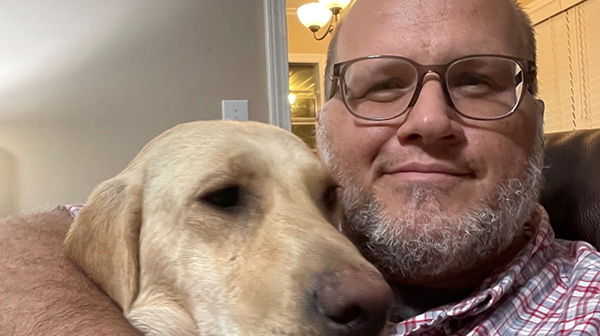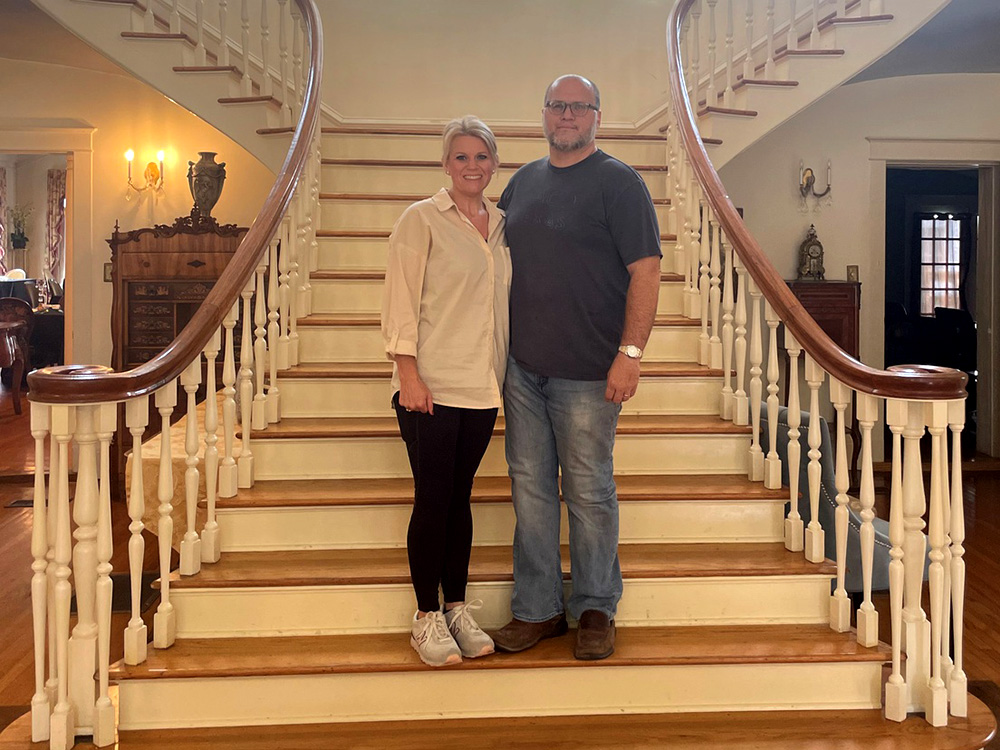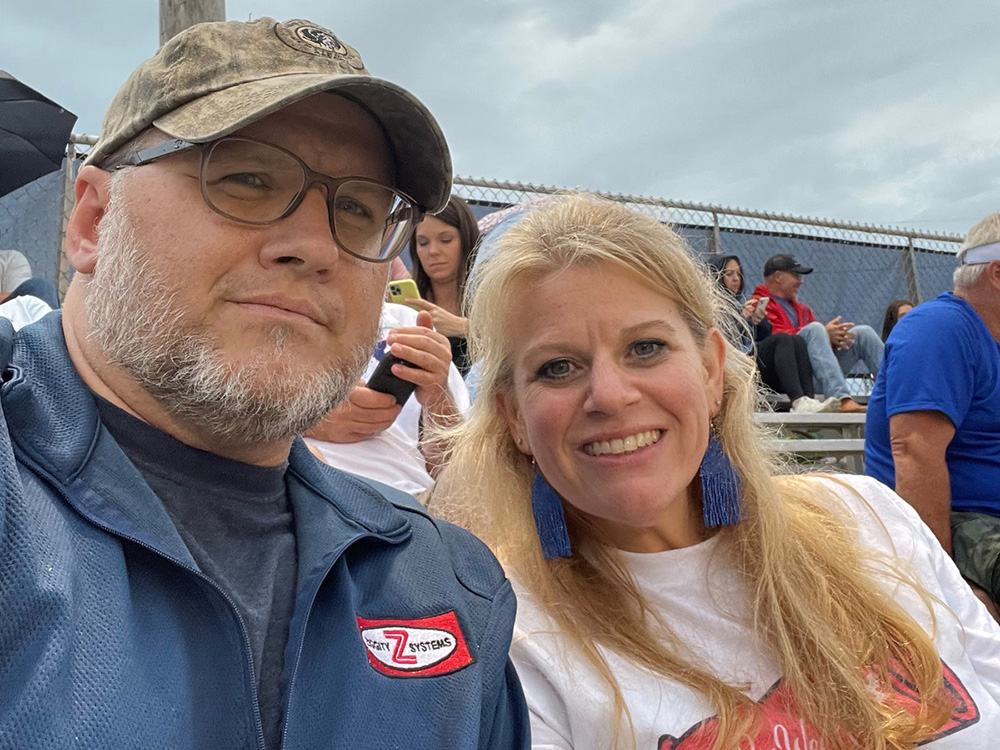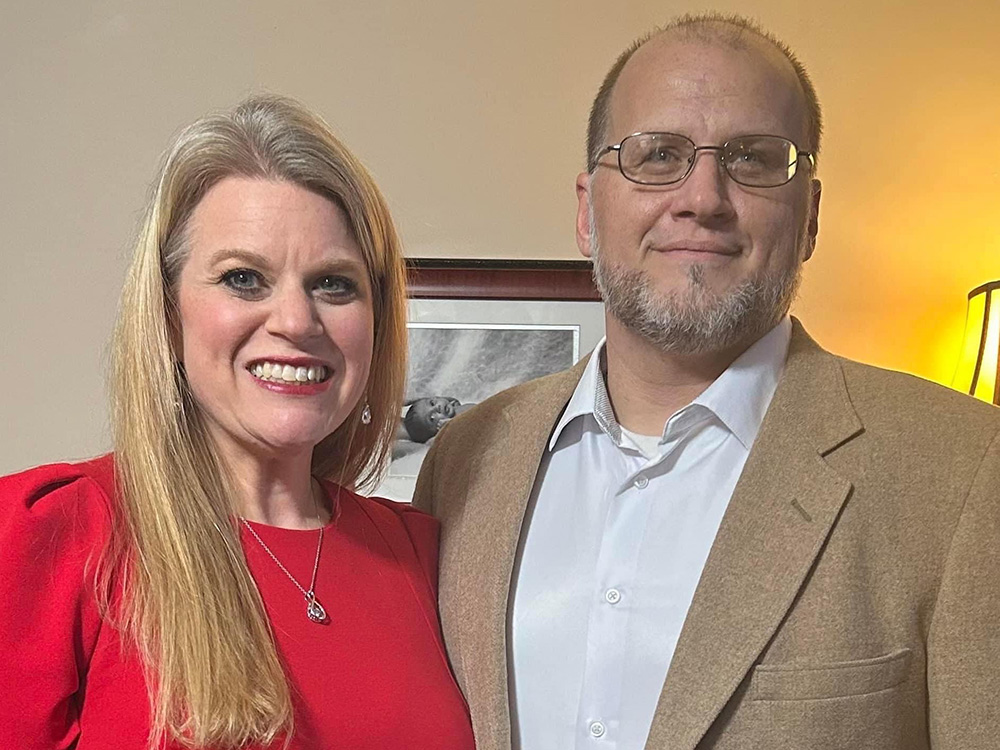Shannon’s story
Before he found Enterra Therapy, Shannon felt that gastroparesis would take his life. Now, thanks to his faith and his device, Shannon and his family are thriving once more.

Shannon, Enterra® Therapy patient
Having dealt with various illnesses since childhood, it’s difficult for Shannon to know when his gastroparesis really began. By his mid-thirties, Shannon almost completely stopped digesting food—going from 210 pounds to 150 pounds in a span of just two weeks. After ordering a gastric emptying test (GET), his doctors finally confirmed that Shannon was living with severe gastroparesis.
Once they identified gastroparesis, what was life like?
Shannon:
When I went into surgery, I weighed 210 pounds. About two weeks later, I was 150 pounds. I was small like that for several years. It was just a very difficult time. Between diagnosis and receiving Enterra® Therapy was about four years. Four long, long years.
DeeDee:
I had never even heard of gastroparesis. I didn’t know what questions to ask, what the outcome would be. He would try different medications, but he was just very sick. He couldn’t keep anything down. And then he would get really dehydrated, and then we’d have to be in and out of the hospital to keep him from being dehydrated. We spent the next several years going back and forth to the doctors, doing all kinds of tests, just trying to figure out something that would work.
What impact did gastroparesis have on your family?
Shannon:
To try to put it into words, it was just a nightmare. Our oldest daughter was 2 when it all happened.
DeeDee:
For a long time, I don’t think she quite understood why he didn’t feel like doing what he used to do with her. I think that was definitely hard for her to understand.
From my point of view, he was just so sick all the time. He’d have good days or bad days, but you never knew, so it was hard to make plans. It was hard to do anything.
He went from working 60 hours a week at the church as a pastor to not being able to work at all. Thankfully, his church was very understanding if he couldn’t come in or was in the hospital. But it completely changed our family. It completely changed him.
I think the biggest adjustment that I had to make when he was sick was that he just wanted to isolate himself because he wouldn’t want anyone to be around. Which I understand, but because it was so long-term, it just felt like he was completely isolated from us.
Shannon:
The lowest point I can remember is one Christmas morning, the girls opened their presents, and I sat in the recliner the whole time, I didn’t interact a whole lot. I was so sick I couldn’t go to Christmas at DeeDee’s family’s house. So I sat at home and watched Law & Order all day long. And by the time they got home that night, I was so depressed I was ready to give up. I was just so down.
How did you find out about Enterra® Therapy?
Shannon: One of my doctors, he was a complete godsend. I remember meeting him for the first time. As soon as he walked in, it was like we were instant friends. He was so patient and so willing to try things to get me well.
Eventually, after years of testing and trying different things and being so sick, he said, “I think you’re a candidate for gastric electrical stimulation. Some people see great results with it, and some people don’t. But I think we should try it.”
DeeDee:
Truthfully, when I heard about Enterra Therapy, I was nervous because of a previous surgery that he had gone through that led to extreme complications. So when they started talking about another surgery I was scared that something like that was going to happen again. Because he was so weak at that point, I knew he couldn’t afford to get any worse. I was definitely nervous—I had never heard of it. I didn’t know of anyone that I could even talk to about it.
Shannon:
Yes, she was more hesitant than I was. But when we started talking about it, I would have been willing to let them do it right then. I was like, “Go ahead and put it in!” I was just willing to try anything at that point. And so my doctor started the process for me to be able to get the surgery.
You’ve said that even after you received your Enterra Therapy System, things got worse before they got better. Can you share more about that?
Shannon:
For me, this point in the story is where things start to get extremely sad.
I was so sick. I was literally convinced that I was about to die. You just could not have convinced me any other way.
I had a wife and two baby girls, and I quit my job and we moved back home. And my plan was to just lay in bed and die. That’s where I was at.
DeeDee:
I didn’t realize it at the time, but looking back at pictures from then, you can just tell. His cheekbones stuck out, his eyes were sunken in. He looked gray.
Shannon:
But every Sunday, I had somewhere to preach. And that would force me during the week to get out of bed to study and pray and prepare. It was hard on my body.
But one of the churches I went to preach at was my family’s old church. I didn’t know it at the time, but they were going to call me to be their pastor. I believe that God used my faith and my family, and that church to give me a sense of purpose again. And I think that really helped. That’s what kept me going during that time.
DeeDee:
And throughout this period he started getting better. He was able to preach and do visits and serve. It was gradual, I think because he was so sick before he got the Enterra Therapy System. I’d say it took probably 6 to 10 months for him to see a radical change after his implantation procedure.
Shannon:
Yes. It took time, but I steadily started getting better because of the therapy—getting my strength back, my appetite back. I just dug my heels in and said, “I’ve got to get better.”
And once it started, it was amazing how quickly the weight started coming back. I didn’t look like a skeleton anymore. My muscles started coming back, I had to get new clothes. I eventually went back to the size I was before surgery.
How are you and your family doing these days?
Shannon:
In the last seven years since receiving Enterra Therapy, we’ve been trying to get back to normal. At one point, gastroparesis took everything from us. We literally had to start everything over again. Emotionally, physically, financially—it robbed us of everything.
But today, our girls are thriving. I’m glad they were younger and can’t remember much, because that really was such a hard time.
DeeDee:
They can really see the difference it’s made for him. He rarely has to miss anything these days because of being sick. And I think that Shannon has been able to find purpose again through serving and working. Before, the only thing you could focus on was not being sick. But now you’ve been able to get to the point where you found purpose in life again.
Shannon:
I can remember, some days, eating a spoonful of rice, and I would get sick and vomit it back up. I didn’t feel like I could walk. I couldn’t think straight. It has radically changed me. I’m still not the person I was before I was sick. I don’t know that I’ll ever be the person I was before I got sick. Which is sad, because I really miss the person I was.
But an older pastor friend told me one day, “You can’t let this sickness define who you are.” And I already felt that way before, but after he said it, it clicked in my mind, “This sickness doesn’t define me.” It took my focus off being in pain all the time, and turned it into doing what I was called to do.


Shannon, when you meet people who are in a similar situation, what advice do you give?
I share my story everywhere I go, and it’s amazing how many people have gastroparesis who have never heard of gastric electrical stimulation. It’s unreal. And so I try to encourage people to keep going and keep fighting. I’ve talked to a lot of people over the years about this.
I’ve met so many people over the years, and I always tell them: do your best to eat and keep fighting.
You also have to make yourself be around your family. The disease makes you want to isolate, but be around your family and friends, and get the best healthcare you can.
It’s amazing the people you meet who just need a little encouragement to keep going and keep fighting. So that’s what I always tell people: Keep your faith. Don’t give up.

Shannon’s experience is unique to him and individual results may vary.
Could Enterra Therapy be Right for You?
Answer a few short questions to see if you may be a candidate and get a downloadable guide to help you start a conversation with your doctor.
MKT-D-0003, Rev U
IMPORTANT SAFETY INFORMATION
Enterra Therapy for treatment of chronic, resistant to medication nausea and vomiting associated with gastroparesis caused by diabetes or an unknown origin in patients aged 18 to 70 years: patients should always discuss potential risks and benefits of the device with their physician.
*HUMANITARIAN DEVICE
Authorized by Federal law for use in the treatment of chronic intractable (drug refractory) nausea and vomiting secondary to gastroparesis of diabetic or idiopathic etiology in patients aged 18 to 70 years. The effectiveness of this device for this use has not been demonstrated. What does this mean?
